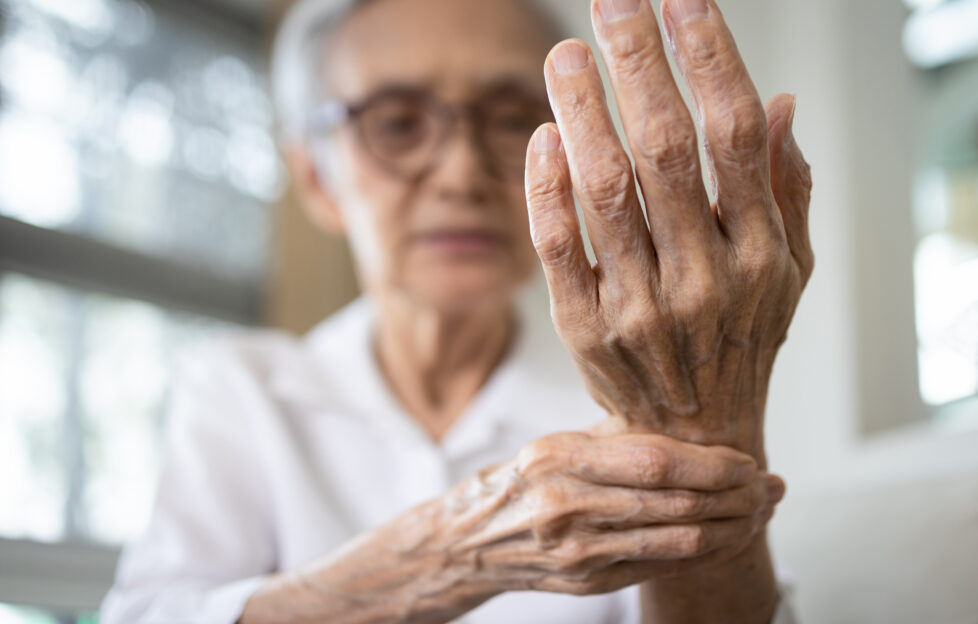Common Arthritis Questions Answered

To mark this year’s World Arthritis Day, Kerry John, a trained nurse and Regional Director for Bupa Care Services, answers our most Googled arthritis questions from the past 12 months.
What causes arthritis?
In the UK over 10 million people suffer from arthritis, a common condition that causes pain, swelling and stiffness in your joints. The risk of developing most types of arthritis increases with age and is more common in women than men.
There are two main types of arthritis – osteoarthritis and rheumatoid arthritis.
Osteoarthritis is the most common form and occurs when the cartilage at the ends of your bones gets worn down. This can lead to pain, swelling, and difficulty moving the joint.
The exact cause of osteoarthritis is still unclear, but certain factors increase your risk, including your age, as it’s more likely to impact older people. Women are also affected more than men, and people who are overweight are also at higher risk.
A family history of osteoarthritis or previous joint injuries can also increase your chances of developing this type of arthritis.
Elsewhere, rheumatoid arthritis is an autoimmune condition which means it’s caused by your own immune system attacking healthy body tissues. This causes inflammation and damage to your joints.
Again, it’s not clear why some people develop rheumatoid arthritis, although it’s thought there may be a genetic link.
It could be that something in the environment – like an infection – can trigger development of the condition in people who are already susceptible.
Does it cause swelling?
Yes – the lining of joints become inflamed, and this can cause swelling.
You can reduce your swelling by keeping your joints moving through daily and doing gentle stretches.
Using an ice pack on the swelling can also help, as can keeping a good posture, and listening to your body when it needs to rest. However, a warm bath or heat packs can also help relax the muscles and some consultants recommend hot and cold therapy being alternated.
Lifestyle changes – for example managing your weight and stopping smoking – may also help.
Many types of medications are available for arthritis pain relief, speak to your doctor or pharmacist about your pain and swelling, as they’ll be able to help.
Does it make you tired?
We all get tired from time-to-time. However, fatigue and arthritis go hand in hand for those with arthritis. Dealing with long-term pain, stiffness and swelling can affect your everyday life, including your sleeping habits and wellbeing, leaving you feeling exhausted.
It’s important to listen to your body and rest when you can.
Is exercise good for arthritis?
Exercising regularly, as much as you’re able to, is one of the most beneficial things you can do.
This is because exercise can help to keep your joints working well and reduce your pain. It will also help to build up your muscle strength and improve your fitness and may help you to feel better too.
Of course, people’s arthritis may limit the amount of activity they can undertake, so it’s important to find a level that works for you, and gradually work up from this.
You may also find it helpful to speak to your doctor or a physiotherapist.
Also, aim to do a variety of different types of physical activity, including strengthening exercises, aerobic exercises, and stretching.
What’s the best diet for arthritis?
Whilst there’s no specific diet for arthritis, some studies have shown that following a Mediterranean diet, which includes a lot of fresh vegetables, fruits, olive oil, beans, and fish, can ease your symptoms.
Some people also argue that a vegetarian or vegan diet can help reduce the symptoms of arthritis, although more research is needed on this area.
What treatment is available?
There is no cure for arthritis. There are different treatments available, however, which will vary depending on the type of arthritis you have.
If you have osteoarthritis, exercising regularly, maintaining a healthy weight, and using heat and ice pack methods can help with the pain.
There are also various treatment options for managing osteoarthritis that your GP will discuss with you. These include medication, supportive therapies, and surgery.
For rheumatoid arthritis, there are many treatments that can control the condition.
Treatments can reduce the pain and inflammation, and slow down or even completely prevent your joints from being damaged.
The earlier you start treatment, the more effective it will be. Medication (for example steroids or painkillers) and surgery may also help.
In any case, it’s best to speak to your doctor about what treatments are available and best-suited to your symptoms.
Are tomatoes bad for arthritis?
There’s a common misconception that tomatoes, peppers, and potatoes will make your arthritis symptoms worse.
There is currently no evidence to show a restricted diet (for example cutting out tomatoes) eases your symptoms. Instead, a balanced diet full of fresh fruit and vegetables can help.
Can you get arthritis in your feet?
Arthritis can affect any joint in your body and is common in the small joints in your feet.
For example, osteoarthritis affects the feet of one in six people over the age of 50.
If you have arthritis in your feet, make sure you invest in the right footwear, manage your symptoms through self-help and medication, and aim to exercise as much as you can.
Do you have more arthritis questions? Click here to visit the Arthritis National Research Foundation website.
For more health tips from “The People’s Friend”, click here.










